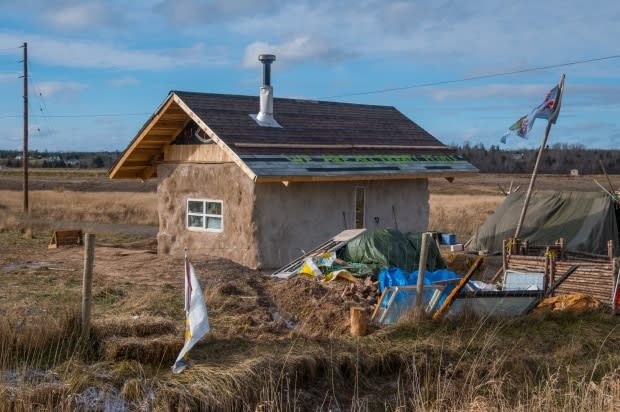No 'depth' to consultation with Mi'kmaq on Alton Gas, lawyer argues
The lawyer representing Sipekne'katik First Nation says there was no "depth" to the province's consultation with the band over a controversial natural gas project.
Lawyer Ray Larkin made his arguments before Justice Frank Edwards at Nova Scotia Supreme Court Tuesday.
It was the first day of what's scheduled to be a two-day appeal hearing that centres around the Crown's duty to consult with Indigenous peoples in matters that could affect their treaty and Aboriginal rights.
It's a duty that comes from Canada's Constitution Act, applies to federal and provincial governments and has been upheld in several Supreme Court of Canada rulings.
Larkin said Sipekne'katik has the right to consult on the Alton Gas project because of its rights to fish for food, ceremonial purposes and to make a moderate livelihood, which are established in treaties and case law.
He said the band also has a legitimate claim to aboriginal title in the Crown land around the Shubenacadie River where Alton Gas wants to build a natural gas storage facility.
Because of those established treaty rights and asserted title rights, Larkin said the case demands a "deep" level of consultation.
"Deep consultation involves having the kind of thorough discussion of all the issues and a dialogue, a meaningful dialogue on all of those issues, and finding accommodations to the Aboriginal treaty rights that are affected," Larkin told reporters outside court.

The appeal has its roots in a 2016 industrial approval granted by Margaret Miller, the environment minister at the time, to Alton Gas, a subsidiary of Calgary-based energy company AltaGas.
Larkin told the court Miller's decision was legally flawed because the consultation had no "depth."
He said Miller's error was the same as the one made by the National Energy Board in the Clyde River case. In 2017, the Supreme Court of Canada ruling quashed seismic testing in Nunavut over inadequate consultation with Inuit.
The 2016 industrial approval gave Alton Gas the green light to start construction of an underground natural gas storage facility in Alton, N.S.
Band wants court to overturn industrial approval
Larkin said Sipekne'katik is looking for the court to overturn the industrial approval and direct the province to re-engage with the First Nation band before making a new ruling on the Alton Gas proposal.
The proposal is to use water from the nearby Shubenacadie River to flush out natural salt deposits, creating caverns that Alton Gas says could store up to 10 billion cubic feet of natural gas.
The company and the province both tout the project as a potential boon for natural gas users in Nova Scotia, because it would allow for the fossil fuel to be stockpiled, protecting rates against seasonal spikes.

But the project has faced opposition. Miller's 2016 industrial approval was met with six separate appeals, some of which expressed concern for the ecosystem of the Shubenacadie River.
According to Alton Gas's plan, the briny mixture of river water and salt from the underground deposits would be gradually reintroduced to the river over two to three years.
Miller said consultation was sufficient
Sipekne'katik appealed on the grounds that the band had not been adequately consulted, but Miller dismissed all the appeals. She said Indigenous consultation was sufficient.
Sean Foreman, lawyer for the province, maintained that argument in court Tuesday.
Foreman said that while the specific language of "deep" consultation was not always used in the recorded dealings between the province and the First Nation, the process still met the highest standard of consultation.
This is the second time Sipekne'katik has taken the matter to the province's high court.
In 2017, a justice found some procedural unfairness in the industrial approval process — the Department of Environment had failed to share some pertinent documents with the First Nation band.
Once that matter was settled in April 2019, Miller upheld the industrial approval and said the province had sufficiently consulted with Nova Scotia's Mik'maq.
Sipekne'katik disagreed, again, and sought another review, leading to this month's hearing.
Arguments are set to conclude in court Wednesday.
MORE TOP STORIES


